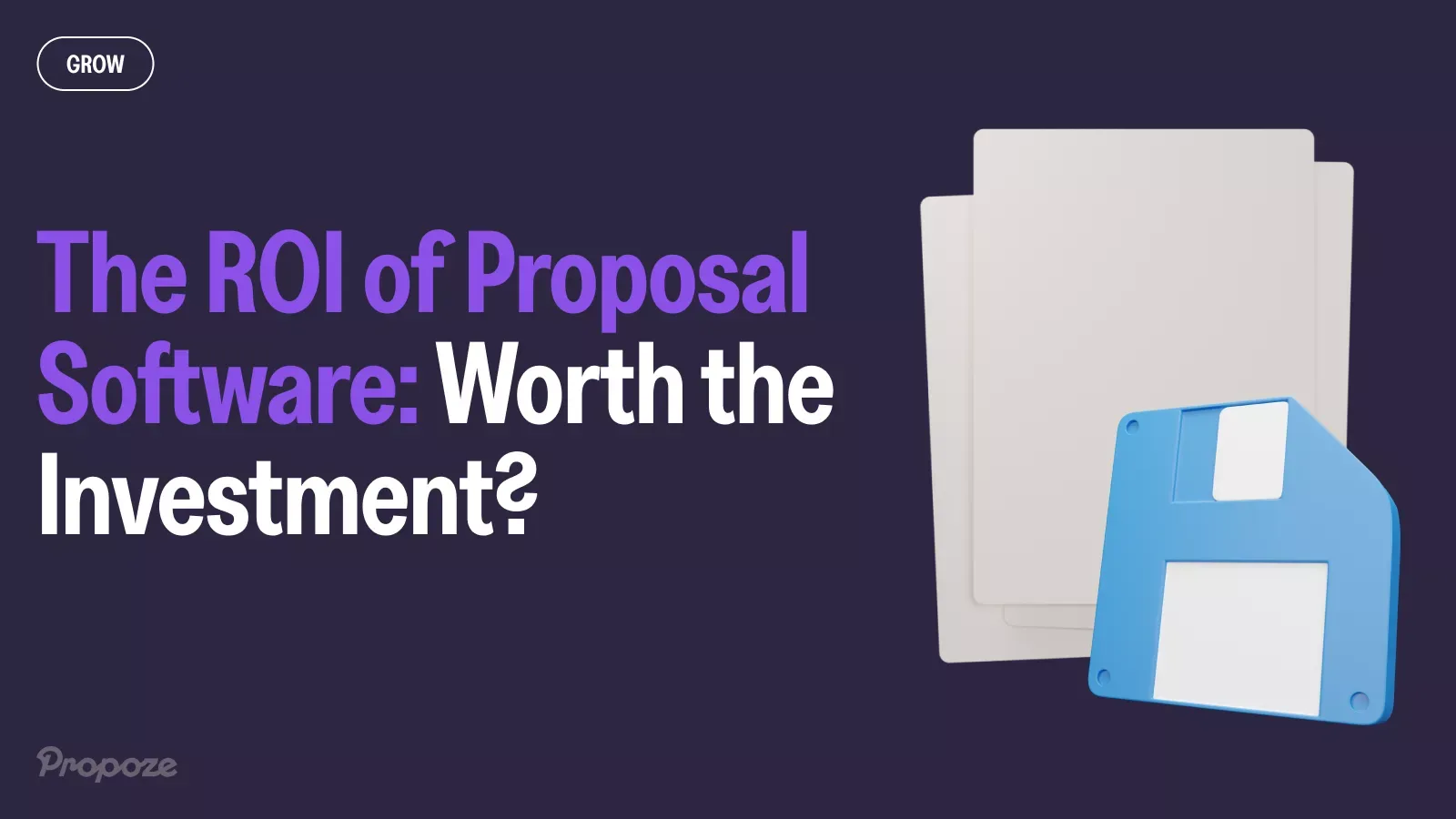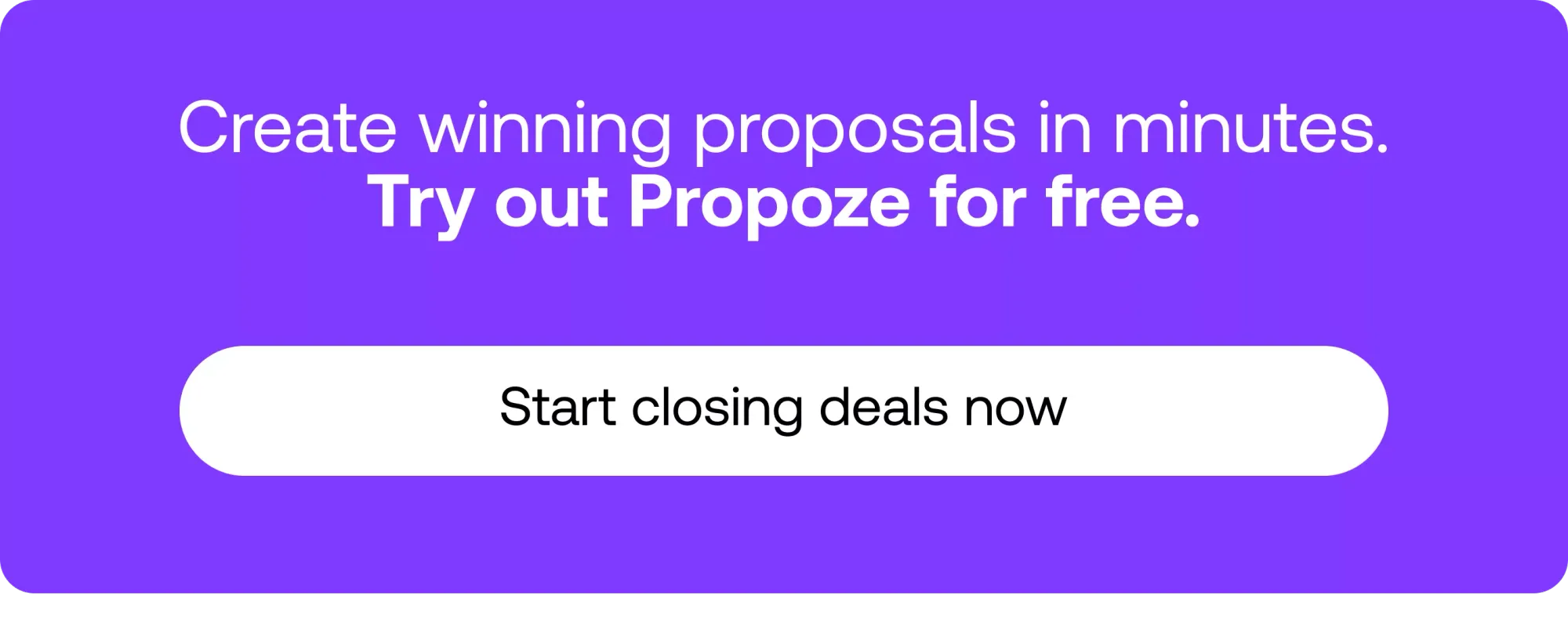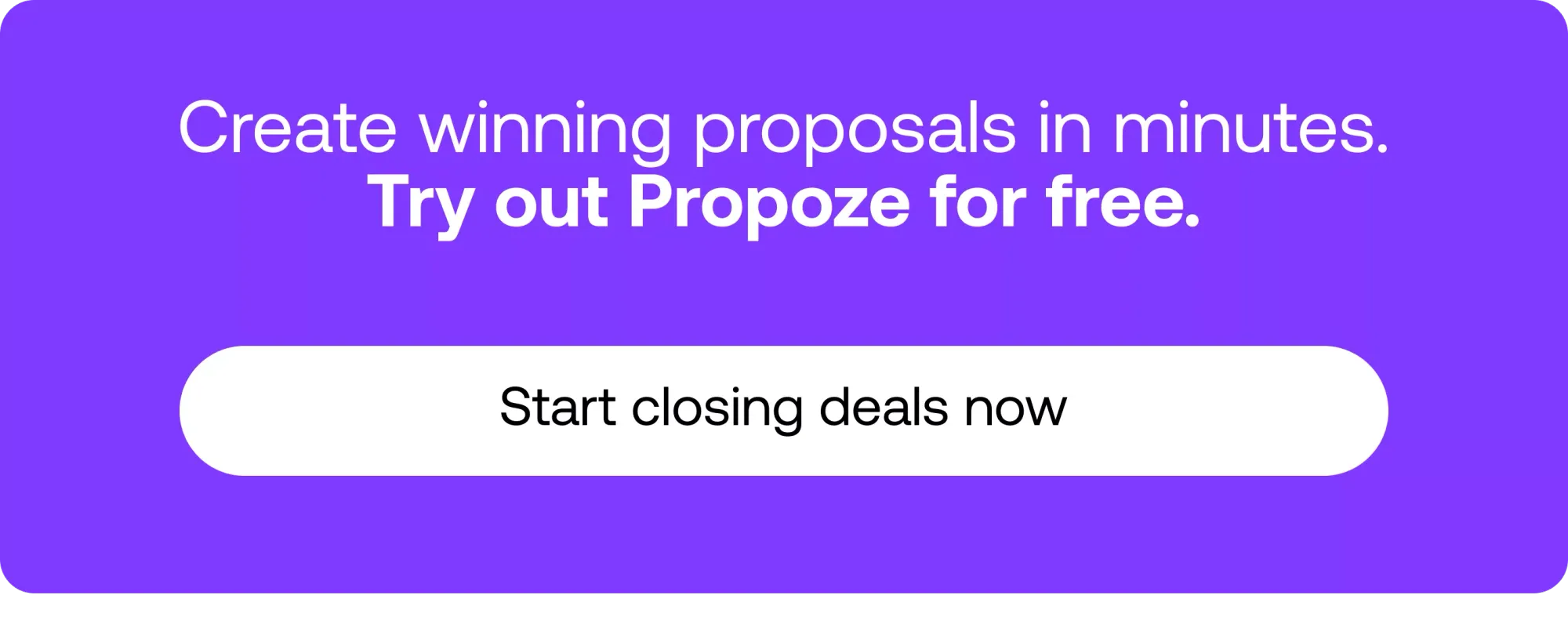Why Investing in Proposal Software Delivers High ROI
Discover how investing in proposal software can significantly boost your ROI by saving time, reducing errors, and enhancing proposal quality.
— Propoze

Investing in proposal software can significantly improve your sales process, but is it truly worth the cost?
In this post, we’ll explore the ROI of proposal software, focusing on how it saves time, reduces errors, and boosts proposal quality while driving long-term financial benefits.
Whether you're looking to enhance productivity or streamline workflows, understanding the real return on your software investment is essential.
Read on to discover why proposal software could be the game-changer your business needs.
Proposal automation saves you tons of money
For businesses relying on manual proposal creation, inefficiencies can quickly become expensive.
Proposal software not only saves time but also slashes labor costs by automating tedious tasks like data entry, document formatting, and follow-ups.
This eliminates the risk of costly errors, such as pricing mistakes or missing client information, which often require rework and slow down the process.
Moreover, automation allows businesses to scale effortlessly. As proposal volumes grow, you can manage more clients without needing additional resources.
The cost benefits extend even further—automation ensures a higher level of accuracy and consistency, which we'll explore in the next section.
This precision helps elevate proposal quality and win rates, turning cost savings into competitive advantages.
Reducing human errors
Human errors, such as pricing inaccuracies or outdated client data, can lead to costly setbacks—whether it’s lost deals or delayed timelines.
Businesses relying on manual processes often encounter these mistakes, damaging client trust and prolonging sales cycles.
Proposal software eliminates these risks by automating data entry and pulling up-to-date information from CRM systems, ensuring consistency and accuracy.
Key benefits:
- Automated data entry: Reduces human input and ensures data accuracy.
- Standardized templates: Ensure consistency across all proposals.
- Error reduction: Minimized risk of mistakes like pricing or formatting errors.
- Up-to-date information: Real-time data integration from CRM systems keeps proposals accurate and relevant.
With automation, your proposals become more reliable and professional, improving client trust and streamlining the entire process.
Fewer mistakes = fewer costly revisions
Errors in proposals often result in expensive and time-consuming revisions, whether it’s fixing incorrect pricing, reworking content, or addressing formatting issues.
These revisions slow down the sales process, delay deal closures, and, in some cases, may lead to lost opportunities altogether.
By using proposal software, these mistakes are minimized, thanks to automation and standardized processes. This reduces the need for constant back-and-forth adjustments, enabling teams to send proposals faster and with more confidence.
Key benefits:
- Reduced back-and-forth revisions: Less time wasted on correcting errors.
- Faster proposal turnaround: Teams can submit proposals more quickly.
- Fewer lost opportunities: Accurate proposals improve client trust and increase deal closure rates.
Fewer revisions translate directly into reduced costs and a more efficient sales process, ultimately leading to higher productivity.
Proposal software saves you time and increases productivity
Proposal software doesn’t just speed up individual tasks—it transforms how entire sales teams operate. By automating data entry, formatting, and tracking, your team can produce high-quality proposals in a fraction of the time.
This allows you to handle more proposals, increasing the chance of winning new business without adding more staff or resources.
Improved collaboration is another key benefit. With real-time updates, multiple team members can contribute seamlessly to proposals, reducing miscommunication and avoiding version control issues. This ensures higher quality, faster delivery, and fewer errors.
By freeing up time once spent on manual, repetitive tasks, your sales team can now focus on building stronger client relationships and making strategic decisions that drive growth.
Time saved means more opportunities to pursue new deals, deliver personalized client experiences, and ultimately accelerate revenue generation.
Proposal automation tools speed up your sales process
For many teams, manual proposal creation is a bottleneck that delays deal closures and creates unnecessary frustration.
Proposal software automates these time-consuming tasks — such as data entry, formatting, and follow-ups — freeing up time for more critical activities, like client engagement.
Key benefits of automation:
- Data integration: No more manual data entry—automatically pull client information from your CRM, ensuring accuracy.
- Pre-built templates: Streamlined templates maintain consistency and branding across every proposal, eliminating the need for repetitive adjustments.
- Instant formatting & quick edits: Adjust proposals quickly, allowing for faster delivery to clients.
- Real-time tracking & faster approvals: Automation allows you to monitor the status of each proposal and receive instant notifications, speeding up internal approvals.
These automated processes don’t just save time—they help your team respond to opportunities faster and more efficiently. By reducing manual tasks, you shorten the sales cycle, close more deals, and ultimately boost your bottom line.
Improve proposal quality and win rates with proposal software
Manual proposal creation often leads to inconsistencies and errors that can weaken your pitch.
Imagine sending out a proposal with outdated pricing or a typo in the client’s name — these small mistakes can harm your credibility. Automating your proposal process not only removes these risks but also boosts the overall quality. Every proposal is precise, consistent, and formatted to impress.
By pulling accurate data directly from your CRM, each proposal becomes personalized and highly relevant, addressing your client's specific pain points and goals. This attention to detail strengthens client trust, positioning your business as a reliable and professional partner.
Better proposals don't just close deals faster—they leave a lasting impression. When clients receive a well-crafted, error-free proposal, they are more likely to choose your business over competitors.

Better personalization through CRM integrations
When you combine CRM integration with data-driven insights, proposal personalization reaches a whole new level.
By pulling from client-specific data such as past interactions, purchase history, and industry trends, you can create highly tailored proposals that resonate deeply with each prospect.
This ensures your proposals aren't just standard templates but are customized to address the exact needs, challenges, and preferences of each client.
Key benefits:
- Actionable insights: Leverage real-time analytics and historical data to target client pain points and offer specific solutions.
- Client-specific proposals: Automatically customize every proposal, from pricing to messaging, based on up-to-date CRM data.
- Stronger client engagement: Personalized proposals build trust, showing clients that you understand their unique needs.
- Accurate data: CRM integration ensures all details, from contact information to preferences, are up-to-date, minimizing errors and improving proposal relevance.
- Enhanced customization at scale: Use data-driven insights to generate personalized proposals efficiently, eliminating the need for manual customization.
By automating personalization through CRM and enhancing it with data-driven insights, your proposals become not only more efficient to produce but also far more compelling and client-centric.
This results in stronger client relationships, higher engagement, and ultimately, more closed deals. Clients will feel understood and valued, which translates to better conversion rates and long-term loyalty.
What are the long-term financial benefits of proposal software?
Investing in proposal software offers significant long-term financial benefits that extend beyond just time savings. By automating labor-intensive processes, companies can reduce overhead costs, minimize human errors, and improve resource allocation.
These efficiencies lead to higher productivity, faster proposal turnaround times, and ultimately, more closed deals.
In addition, proposal software helps standardize quality and consistency, reducing costly rework and revisions. As businesses grow, the scalability of automated tools allows them to handle increased proposal volumes without needing to expand the workforce, further improving profitability and return on investment (ROI).
The result? A streamlined process that improves both top-line revenue through higher win rates and bottom-line savings through operational efficiencies.
How to measure your proposal success? Here are the key ROI metrics
To fully assess the ROI of proposal software, it’s important to measure several key metrics. Here’s how to track each one effectively:
Time saved
Compare how long your team takes to generate proposals manually versus with automation. Use project management tools or time-tracking software to quantify time reductions.
Win rate
Track the percentage of proposals that result in closed deals before and after implementing proposal software. Use CRM systems to monitor closed-won deals over time.
Error reduction
Analyze the number of mistakes (e.g., pricing errors, formatting issues) made in proposals before automation. Compare this to automated proposals using a simple audit log or error tracking system.
Sales cycle length
Measure how long it takes to close a deal from proposal submission to final agreement. Calculate the average time before and after using proposal software through CRM reports.
Productivity gains
Evaluate how many more proposals your team can complete with the same resources. You can track this by calculating the increase in proposals submitted per week or month.
Tracking these metrics helps you clearly quantify the efficiency, accuracy, and financial benefits gained from adopting proposal software, allowing you to continuously optimize and improve your processes.
How to choose the right proposal software for your business?
Choosing the right proposal software is crucial for improving your sales process, boosting productivity, and increasing win rates. With so many options on the market, you need to focus on finding a solution that aligns with your unique business needs.
The right software will streamline your workflow, integrate with your existing tools, and grow with your business.
Here are the key factors to consider when making your decision.
Ease of use
A proposal software should be user-friendly and require minimal training. If the platform is too complicated, it could slow down adoption and reduce productivity.
Look for intuitive interfaces that allow team members to quickly learn and implement the tool. Easy navigation and drag-and-drop functionalities are essential for speeding up the proposal creation process without sacrificing quality.
In short, here’s what to look for when considering ease of use:
- Simple interface: Ensure the software is intuitive and easy to navigate.
- Minimal training: Look for platforms that don’t require extensive onboarding.
- Quick setup: Choose tools with fast implementation to get your team working faster.
Customization options
No two businesses are the same, and neither are their proposals.
Your proposal software should offer robust customization features that allow you to create proposals tailored to your clients’ needs. Whether it’s adjusting templates, adding unique branding, or modifying workflows, flexibility is key.
Customization ensures each proposal aligns with your messaging and resonates with clients, making it a powerful tool for standing out in competitive markets.
In short, here’s what to look for when considering customization options:
- Tailored templates: Ensure templates can be customized for branding and client needs.
- Flexible workflows: Modify processes to fit your sales cycle.
- Client-specific proposals: Personalize proposals to reflect unique client needs.
Integration with CRM/other tools
Seamless integration with your CRM and other key business tools is a must. A good proposal software should easily pull data from your CRM to populate client information, track interactions, and maintain consistency across proposals. Integration with platforms like Salesforce, HubSpot, or Pipedrive helps ensure a smooth flow of information and reduces manual data entry, saving time and reducing errors.
In short, here’s what to look for when considering 3rd party integrations:
- Seamless data syncing: The software should easily integrate with your CRM.
- Automation: Automate data entry and client tracking.
- Cross-platform access: Ensure it connects with tools like marketing and finance software.
Scalability
As your business grows, your proposal software needs to scale with it. The software should be able to handle an increasing volume of proposals without becoming overly complex or expensive. Look for solutions that offer scalable pricing models and features that can grow with your team, ensuring the software remains a valuable investment over time.
In short, here’s what to look for when considering scalability:
- Handles increased volume: Choose software that grows with your business.
- Flexible pricing: Look for pricing models that scale with your usage.
- Advanced features: Ensure the tool offers higher-level features as your business expands.
Customer support
Even the best software can run into issues, and when that happens, responsive customer support is critical. Choose a proposal software provider that offers strong support options, whether it’s live chat, phone, or a comprehensive knowledge base. Fast, reliable support helps prevent disruptions in your workflow and ensures that your team can continue delivering proposals on time.
In short, here’s what to look for when considering customer support:
- 24/7 support: Check for round-the-clock availability.
- Knowledge base: Ensure the provider offers comprehensive self-help resources.
- Responsive help: Look for live chat or phone support for immediate troubleshooting.
By considering these factors—ease of use, customization, integration, scalability, and customer support—you can select the right proposal software that aligns with your business goals and drives long-term success.

How to consider the ROI of proposal software for different industries
Different industries derive unique ROI from proposal software, driven by their specific operational needs and proposal requirements.
B2B & enterprise:
- Streamlining complexity: In B2B, proposal software reduces the time and cost of managing multi-department proposals, minimizing errors and ensuring consistency.
- Scalability: With growing deal sizes, automated proposals allow businesses to scale without proportionate increases in workload. For example, companies have seen up to a 25% reduction in proposal-related administrative costs.
Creative agencies:
- Tailored visual impact: Customizable templates and interactive proposals help agencies stand out, leading to a 20% higher client engagement rate.
- Improved win rates: Personalized, visually engaging proposals make clients feel valued, driving higher conversion rates.
Professional services:
- Accuracy and compliance: In fields like law or finance, where precision is key, proposal automation reduces the risk of human error and ensures adherence to regulatory standards. For instance, firms report 15% fewer compliance-related revisions.
- Reputation enhancement: Consistent, high-quality proposals help build a trustworthy brand image, boosting client retention rates.
Manufacturing:
- Document management: Manufacturing businesses benefit from faster proposal turnarounds by automating data entry, document collection, and approval processes. This cuts down on delays and improves client satisfaction, reducing the proposal cycle time by up to 30%.
- CRM integration: With up-to-date client information synced from CRM, manufacturing firms can deliver accurate proposals, improving their chances of closing deals faster and more efficiently.
Using proposal software that fits your business doesn’t just make things run smoother—it gives you an edge. With faster, automated proposals, your team has more time to focus on clients and closing deals. This means quicker sales, higher success rates, and more time for important tasks. In the long run, these improvements lead to loyal customers and steady growth. The right software isn’t just a tool—it’s key to your business’s ongoing success and staying ahead of the competition.
Regardless of which proposal software you choose, you must carefully balance features and costs for maximum impact.
Here’s what to consider when choosing a proposal software:
- Prioritize core features: Focus on must-haves like automation, CRM integration, and customization.
- Scalable pricing: Choose a tool with flexible pricing that grows with your business.
- Assess long-term value: Opt for software that offers both immediate benefits and long-term ROI, ensuring you’re investing wisely in a solution that evolves with your needs.
By carefully evaluating features against cost, you can ensure you’re getting the most value without overpaying for tools you won’t fully utilize.
Ready to transform your sales process? Start using Propoze today!
Manual proposals slow down your sales process and lead to missed opportunities. Proposal software offers significant benefits by automating tedious tasks, reducing errors, and helping you personalize every pitch.
Here’s why proposal software is crucial for your business:
- Save time: Automate repetitive tasks to focus more on clients and strategy.
- Boost win rates: Deliver accurate, personalized proposals that increase your chances of success.
- Simplify the process: Customizable templates make proposal creation faster and easier.
At Propoze, we make it simple for you to create winning proposals efficiently. With customizable templates and a user-friendly interface, Propoze helps you streamline your workflow, allowing you to focus on closing more deals.
Ready to improve your proposal process? Contact us today or try Propoze for free!